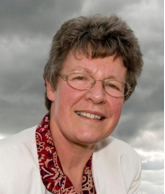 |
| Jocelyn Bell Burnell at the LOFAR-UK station in Chilbolton in September 2010. Credit: James West, SEPnet. |
2011 Grote Reber Gold Medal
Ken Kellerman
The 2011 Grote Reber Gold Medal for lifetime innovative contributions to radio astronomy will be awarded to Dr. Jocelyn Bell Burnell who is currently a Professor of Astrophysics at Oxford University in England. Burnell is being honored for her dramatic 1967 discovery of pulsars, which has had a major impact on 20th century astrophysics, and her continuing contributions to astrophysics and education.
Jocelyn Bell Burnell received her first degree in Physics in 1965 from Glascow University in Scotland and her PhD from the University of Cambridge in 1968. Following a two year Science Research Council Fellowship, she held a Teaching Fellowship at the University of Southampton followed by research and management positions at the University College, London and the Royal Observatory in Edinburgh. After a ten year period as a Professor of Physics at the Open University of the United Kingdom where she studied X-ray sources, she served as Dean of Science at the University of Bath.
Bell-Burnell is best known for her role in the discovery of pulsars. As a research student in Cambridge she was heavily involved in the construction and operation of a long wavelength radio telescope built to study interplanetary scintillations at 4 m wavelength. Later, while inspecting the output chart records, she noticed a peculiar signal form that had a periodic pulse rate close to one second. Like Grote Reber, she initially had to convince her better-established colleagues that her observations were important for astronomy and not due to external interference or a spurious instrumental effect.
She has previously been honored by many prizes and recognitions, including the Albert Michelson Medal of the Philadelphia Franklin Institute, the J. Robert Oppenheimer Memorial Prize from the Miami Center for Theoretical Studies, the Tinsley Prize from the American Astronomical Society, and the Herschel Medal from the Royal Astronomical Society. She has served as President of the Royal Astronomical Society, is a Fellow of the Royal Society, is currently the President of the Institute of Physics, and in June 2007, she was made Dame Commander of the British Empire (DBE) by Queen Elizabeth II.
The 2011 Reber Medal will be presented to Dame Jocelyn in August 2011 at the XXX URSI General Assembly in Istanbul, Turkey.
The Reber Medal was established by the Trustees of the Grote Reber Foundation to honor the achievements of Grote Reber and is administered by the Queen Victoria Museum in Launceston, Tasmania. Nominations for the 2012 Medal may be sent to Martin George, Queen Victoria Museum, Wellington St, Launceston, Tasmania 7250, Australia or by e-mail to: martin@qvmag.tas.gov.au to be received no later than 15 October 2011.http://science.nrao.edu/enews/4.3/index.shtml#groterebermedal

No comments:
Post a Comment